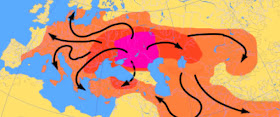What did our European ancestors sound like?
Professor linguist Dr. Andrew Byrd has recently reconstructed his own recordings of Proto-Indo-European language, the language which our ancestors in Europe would have been speaking between 4,500 and 2,500 B.C.
All the information in this link from The Huffington Post.
Professor linguist Dr. Andrew Byrd has recently reconstructed his own recordings of Proto-Indo-European language, the language which our ancestors in Europe would have been speaking between 4,500 and 2,500 B.C.
All the information in this link from The Huffington Post.
Here take a listen of what it could have sounded like:
Here's the phonetic transcription:
Here's the passage translated into English:
A sheep that had no wool saw horses, one of them pulling a heavy wagon, one carrying a big load, and one carrying a man quickly. The sheep said to the horses: "My heart pains me, seeing a man driving horses." The horses said: "Listen, sheep, our hearts pain us when we see this: a man, the master, makes the wool of the sheep into a warm garment for himself. And the sheep has no wool." Having heard this, the sheep fled into the plain.
Galician version of this post @ ArquivosDoTrasno.








.jpg)